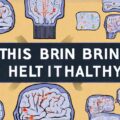Aging is an inevitable part of life, but that doesn’t mean our minds have to decline as we grow older. By adopting a few key habits, we can keep our minds young, sharp, and vibrant. Here are seven effective strategies to help you age gracefully and maintain mental acuity.
1. Stay Physically Active
Regular physical activity is crucial for maintaining not only physical health but also mental well-being. Exercise increases blood flow to the brain, which can help improve cognitive function. Activities like walking, swimming, and yoga are excellent choices that promote overall health and support brain function.
2. Engage in Lifelong Learning
Continuous learning stimulates the brain and keeps it engaged. Whether it’s learning a new language, taking up a musical instrument, or attending educational workshops, challenging your brain with new information and skills can help keep it sharp. Staying curious and open to new experiences is key to maintaining mental flexibility.
3. Maintain a Healthy Diet
A nutritious diet is essential for brain health. Foods rich in antioxidants, healthy fats, vitamins, and minerals can help prevent cognitive decline. Incorporate plenty of fruits, vegetables, whole grains, nuts, and fatty fish into your diet. Omega-3 fatty acids, found in fish like salmon, are particularly beneficial for brain health.
4. Get Quality Sleep
Sleep is vital for cognitive function and memory consolidation. Aim for 7-9 hours of quality sleep each night. Establish a regular sleep routine, avoid screens before bedtime, and create a restful environment to improve sleep quality. Proper rest can enhance your brain’s ability to process and retain information.
5. Stay Socially Active
Maintaining social connections is important for mental health. Engaging in social activities can help reduce stress, improve mood, and stimulate cognitive function. Join clubs, volunteer, or simply spend time with friends and family to stay socially active and mentally engaged.
6. Practice Mindfulness and Meditation
Mindfulness and meditation can significantly improve cognitive function by reducing stress and enhancing focus. Regular mindfulness practices can help improve attention, memory, and emotional regulation. Consider incorporating mindfulness techniques into your daily routine to support mental clarity and well-being.
7. Challenge Your Brain
Engage in activities that challenge your brain and keep it active. Puzzles, brain games, reading, and problem-solving activities are excellent ways to stimulate mental agility. Keeping your brain busy with diverse and challenging tasks can help maintain cognitive function and prevent mental decline.
FAQ
1. Can physical exercise really improve cognitive function?
Yes, regular physical exercise increases blood flow to the brain and promotes the growth of new brain cells, enhancing cognitive function and reducing the risk of cognitive decline.
2. How does a healthy diet benefit brain health?
A diet rich in antioxidants, healthy fats, vitamins, and minerals supports brain health by reducing inflammation and providing essential nutrients that promote cognitive function.
3. What are some examples of brain-challenging activities?
Brain-challenging activities include puzzles, brain games, reading, learning new skills, and engaging in problem-solving tasks. These activities stimulate the brain and help maintain cognitive function.
4. How does mindfulness improve mental clarity?
Mindfulness practices reduce stress and improve focus, which enhances cognitive function. Regular mindfulness and meditation can improve attention, memory, and emotional regulation.
5. Why is social activity important for mental health?
Social activity reduces stress, improves mood, and stimulates cognitive function. Engaging with others helps keep the mind active and supports overall mental well-being.









